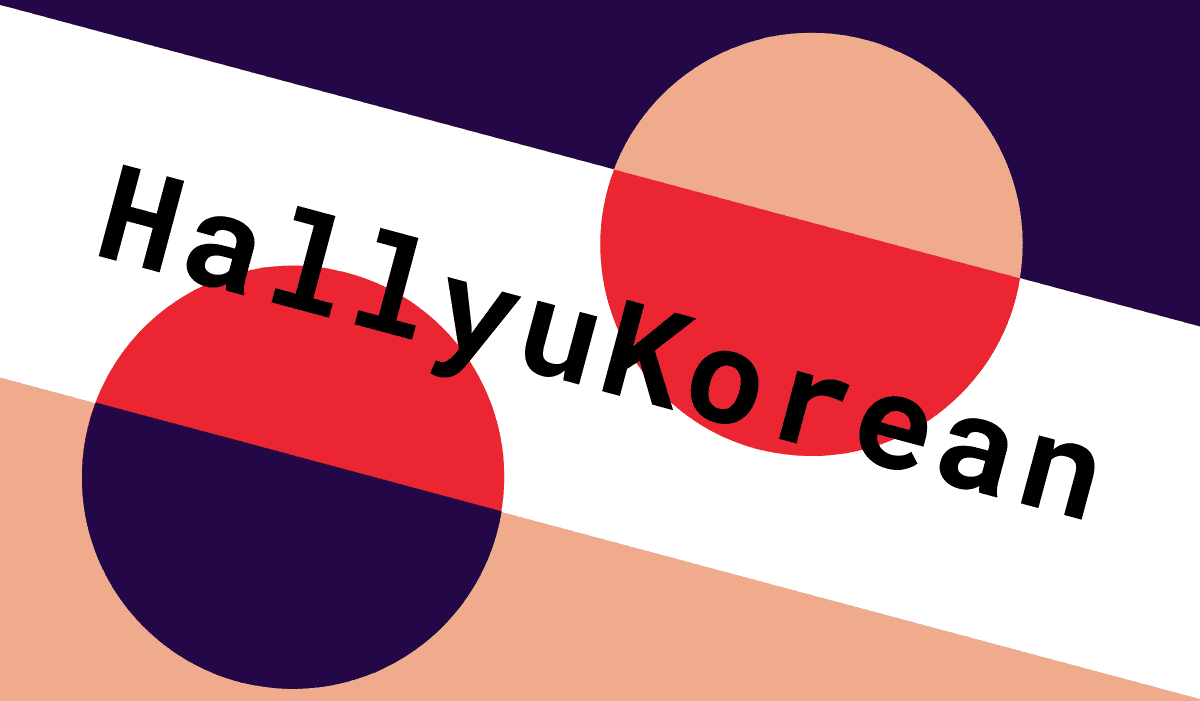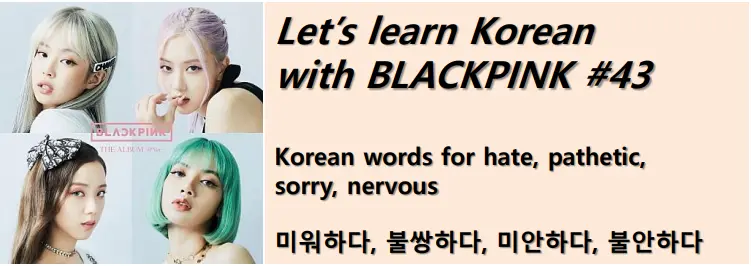Korean words for hate, pathetic, sorry, nervous : 미워하다, 불쌍하다, 미안하다, 불안하다, 아쉽다
Let’s learn Korean words for hate, pathetic, sorry, nervous with BLACKPINK lyrics.
Click the play button below to listen to all the BLACKPINK lyrics used in this post.
미워하다 [mi-wo-ha-da] to hate, to dislike
혹시라도 전화가 울릴까 봐 괜한 기댈 하는 내가 미워
hok-si-ra-do jeo-nwa-ga ul-lil-kka bwa gwae-nan gi-dael ha-neun nae-ga mi-wo
I hate myself for anticipating uselessly if the phone will ring
혹시라도(by any chance) +
전화(phone) + 가(subject particle) +
울릴까 봐(울리다(ring) + ~ㄹ까 봐(be worried that)) +
괜한(useless) +
기댈(기대(anticipation) + 를(object particle), =기댈) +
하는(하다(do) + 는(noun modifier)) +
내가(나(I) + 가(subject particle, =내가) +
미워(hate)
(*Adjective/verb stem + (으)ㄹ까 봐 expresses concern about something.)
불쌍하다 [bul-ssang-ha-da] to be pitiful, to be pathetic
나를 불쌍해 하는 네가 내 눈엔 더 불쌍해
na-reul bul-ssang-hae ha-neun ne-ga nae nu-nen deo bul-ssang-hae
You pity me, but I pity you more for pitying me
*나(I) + 를(object particle) +
불쌍해 하는(불쌍하다(be pitiful) + ~해 하다 + 는(noun modifier)) +
네가(너(you) + 가(subject particle), =네가) +
내(나(I) + 의(of), =내) +
눈(eye) + 엔(to, =에는) +
더(more) +
불쌍해(be pitiful)
(*Adjective + ~아/어/해하다 is used to express the speaker’s feeling of observing something.
By adding ~아/어/해하다, the adjective becomes a verb.)
미안하다 [mi-an-ha-da] to be sorry
미안하단 말 한마디 없이
mi-an-ha-dan mal han-ma-di eop-si
Without even saying sorry
*미안하단(미안하다(be sorry) + 는(topic particle), =미안하단) +
말(word) +
한마디(a word) +
없이(without)
불안하다 [bu-ran-ha-da] to be anxious, to be nervous
오늘 하루도 혹시 날 떠날까 늘 불안해 해
o-neul ha-ru-do hok-si nal tteo-nal-kka neul bu-ra-nae hae
I’m always anxious if you’re gonna leave me today
*오늘(today) +
하루(one day) + 도(too) +
혹시(perhaps) +
날(나(I) + 를(object particle), =날) +
떠날까(떠나다(leave) + ㄹ까(whether or not)) +
늘(always) +
불안해 해(불안하다(be anxious) + ~해하다)
(*As you can see from ‘불안하다’, 불 can be a prefix used to mean ‘not being something’, ‘not doing something’ or ‘not following something’.
The word ‘불안’ (bul-an) is actually a combination of Chinese characters, where ‘불’ (bul) represents negation or instability, and ‘안’ (an) means peace or stability. Therefore, ‘불안’ conveys a state of discomfort or instability, reflecting a sense of unease or fear.
Adjective + ~아/어/해하다 is used to express the speaker’s feeling of observing something.
By adding ~아/어/해하다, the adjective becomes a verb.)
아쉽다 [a-swip-tta] be sorry, be inconvenienced by not having
아쉬울 것도 없어. 진짜 할 만큼 했어
a-swi-ul geot-do eop-seo. jin-jja hal man-keum hae-sseo
There’s nothing to regret. I really did my best
*아쉬울(아쉽다(be sorry) + 을(noun modifier)) +
것(thing) + 도(too) +
없어(there isn’t) +
진짜(really) +
할(하다(do) + ㄹ(noun modifier)) +
만큼(as) +
했어(did)
Grammar Reference
*Adjective + ~아/어/해하다 is used to express the speaker’s feeling of observing something.
By adding ~아/어/해하다, the adjective becomes a verb.
ex)불쌍해 하는 : 불쌍하다(be pitiful) + ~해하다
불안해 해 : 불안하다(be anxious) + ~해하다
Adjective stem + ~아/어하다 is used to express the feeling of observation by the speaker about something.
After removing 다 from the root verb, if the verb stem ends with 아 or 오 then ~아하다 is added.
If the verb stem ends with anything other than 오 or 아 then ~어하다 has to be added.
Also, if the verb stem ends with 하 then ~해하다 has to be added.
*Tense
*Present tense : Adjective/verb stem + ~아/어/해요
*Past tense : Adjective/verb stem + ~았/었/했어요
*Future tense : Adjective/verb stem + ~(으)ㄹ 거예요 / ~ㄹ 게요/ ~겠어요
The basic way to get the verb/adjective stem is to remove 다 from the verb/adjective.
If there is a vowel ㅏ or ㅗ on the final syllable of the adjective/verb stem, 아요(present tense), 았어요(past tense), 을 거예요(future tense) is used.
If there is a vowel other than ㅏ or ㅗ on the final syllable of the adjective/verb, 어요(present tense), 었어요(past tense), ㄹ 거예요(future tense) is used.
Also, if there is 하다 in the adjective/verb, 하다 changes to 해요(present tense), 했어요(past tense), 할 거예요(future tense).
Below you can see the conjugation of 미워하다, 불쌍하다, 미안하다, 불안하다, 아쉽다 by tenses.
| Present tense | Past tense | Future tense | |
| 미워하다 | 미워요 | 미웠어요 | 미워할 거예요 |
| 불쌍하다 | 불쌍해요 | 불쌍했어요 | 불쌍할 거예요 |
| 미안하다 | 미안해요 | 미안했어요 | 미안할 거예요 |
| 불안하다 | 불안해요 | 불안했어요 | 불안할 거예요 |
| 아쉽다 | 아쉬워요 | 아쉬웠어요 | 아쉬울 거예요 |
*Speech levels
The three most commonly used Korean speech levels are 합쇼체 (formal polite), 해요체 (informal polite) and 해체 (informal plain).
*The formal polite style : Adjective/verb stem + ~(스)ㅂ니다
~(스)ㅂ니다 is used more in formal or public situations including the military, news, reporting presentations, meetings and lectures. It’s mainly used to address large gatherings or people you don’t know personally.
*The informal polite style : Adjective/verb stem + ~아/어/해요
~아/어/해요 is most commonly used in everyday life. Compared to the formal polite style, the informal polite style is softer and less formal, so it is mainly used among family members, friends, shopkeepers and other close acquaintances.
*The informal plain style : Adjective/verb stem + ~아/어/해
As for the informal plain style ~아/어/해, it is mainly used among friends from superiors to people of lower rank and among family members.
Below you can see the conjugation of 미워하다, 불쌍하다, 미안하다, 불안하다, 아쉽다 by speech levels.
| Formal polite | Informal polite | Informal plain | |
| 미워하다 | 미워합니다 | 미워요 | 미워 |
| 불쌍하다 | 불쌍합니다 | 불쌍해요 | 불쌍해 |
| 미안하다 | 미안합니다 | 미안해요 | 미안해 |
| 불안하다 | 불안합니다 | 불안해요 | 불안해 |
| 아쉽다 | 아쉽습니다 | 아쉬워요 | 아쉬워 |

